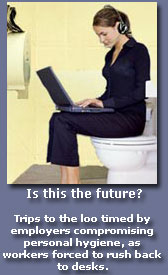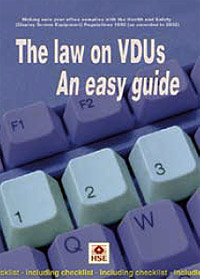Health Problems Are Rife Amongst Call Centre Workers
Says UNISON
The news that physical and mental health of the UK’s million call centre workers is at significant risk, despite health and safety regulations, is absolutely no surprise to the many USR’s working within the call centre industry.
 Ever since the concept of call centres were introduced into the UK, initially by BT with it’s ‘Front Office’, personnel departments and private HR companies have been using computer technology to schedule staffing, monitoring their every movement and wringing every last ounce of work from each individual; often discarding them to the dole queues following performance levels badly effected by stress, WRULD, and sheer exhaustion.
Ever since the concept of call centres were introduced into the UK, initially by BT with it’s ‘Front Office’, personnel departments and private HR companies have been using computer technology to schedule staffing, monitoring their every movement and wringing every last ounce of work from each individual; often discarding them to the dole queues following performance levels badly effected by stress, WRULD, and sheer exhaustion.
Despite legislation, trade unions have been unable to address these issues, and indeed have in the main, accepted such appalling control of staff as if they are simply ‘units’ and statistics.
Now the latest call centre working survey, this time from UNISON highlights the toll that pressurised, target-driven and restrictive, closely-monitored working can take on call centre staff, preventing them from taking the necessary measures to protect their health and wellbeing. A quarter of respondents said that even their access to a toilet is restricted.
By its nature high-volume, and increasingly repetitive, call centre work is responsible for high numbers of health complaints, with nearly 70% of respondents experiencing eyestrain at least some of the time, nearly 60% reporting the same for hearing problems and more than half having problems with their voices.
Of equal concern to UNISON, however, is the number of respondents who reported that their working practices were causing them mental distress. More than 80% of respondents said that their work caused them to feel stressed, and nearly a quarter of those saying the stress experienced has reached a damaging level that impacts on their home and personal life.
Dave Prentis, General Secretary of UNISON said:
“The alarming number of health problems highlighted by the survey shows why health and safety matters, and the folly of this government’s constant attacks on health & safety and the cuts in inspections in workplaces such as call centres.
That this survey has shown more than a quarter have had their basic right to a toilet break restricted or monitored is bad enough, but the physical toll on call workers’ eyes, ears and voices – the tools of their trade – is something that managers and organisations cannot ignore.
 Workers rightly expect their employers to have a duty of care not only to their physical health, but also to their mental wellbeing, and the findings of this survey – that 8 in 10 are experiencing stress, a quarter of them to a damaging degree – must be addressed urgently.
Workers rightly expect their employers to have a duty of care not only to their physical health, but also to their mental wellbeing, and the findings of this survey – that 8 in 10 are experiencing stress, a quarter of them to a damaging degree – must be addressed urgently.
The results of this survey should be a wakeup call for call centre employers, and UNISON demands that they act now before the situation gets even worse.”
Under the Health and Safety at Work Act (HSWA) employers have a duty to protect the health and safety of their employees. In addition, the Management of Health and Safety at Work (MHSW) Regulations require employers to assess health and safety risks in order to identify measures needed to reduce them, but UNISON believes more must be done to improve enforcement and protect this significant group of workers.
The findings of the survey have formed the basis of ‘UNISON Calling’ – a new guide that aims to help UNISON reps work with employers to ensure that the health and emotional wellbeing of call centre staff remains a top priority, and has informed a new Call Centre Charter.
Whilst Trade Unions such as the CWU have campaigned against the ‘mechanisation of human beings’ by call centre employers, none have really addressed the problems says Chris Ingram, Unionsafety web editor and previously health and safety officer at CWU's Liverpool District Clerical Branch who specialised in display screen equipment regulations.
“Trade Unions such as the CWU have been at the forefront of the fight against the treatment of staff as if they are mere ‘robotic units of production’ and have negotiated various deals with employers. In the case of the CWU and BT, most of these agreements have been broken by the employer.”, he told Unionsafety
He continued:
“Whilst management style has been the issue upon which the CWU has concentrated, the scheduling of staff and its appalling impact upon the lives of the individuals concerned and their families; has not been successfully tackled.”
 He added:
He added:
“Trade Unions need to use health and safety law appropriately in order to address the culture of scheduling work in such a way as days off are fragmented with often no two consecutive days off being provided to staff, the monitoring and controlling of even toilet breaks; and the lack of appropriate equipment and work stations that can be found in many call centres throughout the country."
He concluded:
"It is my view, that ultimately, employees can withdraw their labour in a situation where they believe their health to be at risk. Trade Unions need to utilise this aspect of health and safety legislation, and fight back to change the culture of call centre working which is based on bullying and punishing rotas, unrealistic targets, and the de-humanisation of the workplace.
It has always been my view that such action, on health and safety grounds, is the only action which will ultimately force employers to change the culture of montiroing and measuring everything staff do and using shceduling tools to maximise output of staff with complete and utter disregard for the fact they are dealing with human beings and not machines! ”
You can download advice and legislation details from the E-Library Database by choosing category 'Display Screen Equipment'
See also: Office Workstations Pose Alarming Health Risks As Poor Hygiene Becomes The Norm
Source: UNISON


 Ever since the concept of call centres were introduced into the UK, initially by BT with it’s ‘Front Office’, personnel departments and private HR companies have been using computer technology to schedule staffing, monitoring their every movement and wringing every last ounce of work from each individual; often discarding them to the dole queues following performance levels badly effected by stress, WRULD, and sheer exhaustion.
Ever since the concept of call centres were introduced into the UK, initially by BT with it’s ‘Front Office’, personnel departments and private HR companies have been using computer technology to schedule staffing, monitoring their every movement and wringing every last ounce of work from each individual; often discarding them to the dole queues following performance levels badly effected by stress, WRULD, and sheer exhaustion. Workers rightly expect their employers to have a duty of care not only to their physical health, but also to their mental wellbeing, and the findings of this survey – that 8 in 10 are experiencing stress, a quarter of them to a damaging degree – must be addressed urgently.
Workers rightly expect their employers to have a duty of care not only to their physical health, but also to their mental wellbeing, and the findings of this survey – that 8 in 10 are experiencing stress, a quarter of them to a damaging degree – must be addressed urgently.  He added:
He added: